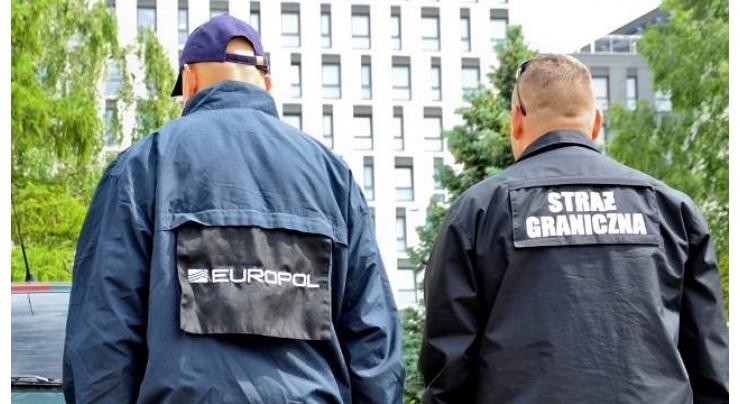
Gangs May Be Laundering Billions Via EU Banks: Europol
Sumaira FH Published September 05, 2017 | 07:50 PM

Europe's police agency unveiled Tuesday a bleak report showing organised crime gangs and terror groups may be laundering billions of euros a year unchecked, despite banks trying to raise the alarm
THE HAGUE, Sept 5 (APP - UrduPoint / Pakistan Point News - 05th Sep, 2017 ) : Europe's police agency unveiled Tuesday a bleak report showing organised crime gangs and terror groups may be laundering billions of Euros a year unchecked, despite banks trying to raise the alarm.
Banks and other private financial institutions reported just under a million suspicious transactions to authorities in the 28 EU member states in 2014, Europol said. While the figures do not go beyond 2014, there has been a "steady increase in reporting volumes," the report said.
Warning "the scale of financial crime is enormous, yet largely unquantifiable," the agency revealed transactions highlighted by just 10 national financial crime units had involved a staggering 178.8 billion euros ($212.9 billion) in 2014.
"Based on an EU GDP of around EUR 14 trillion, these equate to between 0.7-1.28 percent of annual EU GDP," the report noted. Most of the money was believed to have come from organised crime groups, with terror organisations accounting for less than one percent of all the suspicious transactions.
And some 65 percent of all cases were reported by Britain and The Netherlands. Yet, less than 10 percent were subjected to any further investigation, and in only one percent were the funds finally confiscated by European authorities.
"These stark findings make it impossible not to question why the success rate of the system is so poor and what can be done about it," said Europol executive director Rob Wainwright. In a bid to hone the bloc's anti-money laundering abilities, he advocates setting up centralised bank registers as well as establishing one central EU financial intelligence unit.
Part of the problem was that "the anti-money laundering regime still operates at a domestic level, and has not yet fully adjusted to the reality" of what is an international battle, he argued. And even though there is increasing cross-border cooperation between national police forces "significant barriers in international cooperation and information exchange remain, revealing the urgent need for supranational overview in increasingly global markets," Wainwright said.
The increasing popularity of online services and internet payment schemes means the reaction of authorities is "simply too slow to stem the flow of funds which move globally almost instantly," he added.
Related Topics
Recent Stories

Currency Rate In Pakistan - Dollar, Euro, Pound, Riyal Rates On 26 April 2024

Today Gold Rate in Pakistan 26 April 2024

ICC Womens T20 World Cup Qualifier, Match 2: Ireland Women open with Comfortable ..

Robinson, bowlers help New Zealand go 2-1 up against Pakistan

Shahzeb Chachar to hold khuli kachehri on April 26

Heatwave amid Israel's aggression in Gaza brings new misery, disease risk

Tourism must change, mayor says as Venice launches entry fee

Court adjourns Judicial Complex attack case till May 17

Nasreen Noori’s book ‘Popatan Jahra Khwab’ launched

Wafaqi Mohtasib inspection team visits Excise and taxation office

AJLAC announces 5th Conference titled ‘People’s Mandate: Safeguarding Civil ..

Pak-US officials engage to enhance trade, investment ties
More Stories From World
-
Guatemala prosecutors raid international NGO over alleged child abuse
6 minutes ago -
Another State Dept official resigns over US' Gaza policy amid growing student protests
6 minutes ago -
Togo leader Gnassingbe follows father's political playbook
16 minutes ago -
China ready to work with Pakistan to promote practical cooperation under CPEC, GDI: Luo Zhaohui
26 minutes ago -
Indian election resumes as heatwave hits voters
26 minutes ago -
United by grief, families of Boeing crash victims demand justice
56 minutes ago
-
Microsoft expands its AI empire abroad
1 hour ago -
China ready to work with Pakistan to promote practical cooperation under CPEC, GDI: Luo Zhaohui
1 hour ago -
Nuggets push Lakers to brink as Embiid's 50 points lead Sixers over Knicks
1 hour ago -
Man City in title groove as Arsenal face Spurs test
1 hour ago -
Philippine settlement submerged by dam reappears due to drought
1 hour ago -
ByteDance says 'no plans' to sell TikTok after US ban law
2 hours ago